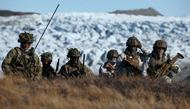Perhaps more important than the price increases themselves was the new world order the embargo signaled. The embargo “set in motion geopolitical circumstances that eventually allowed [OPEC] to wrest control over global oil production and pricing from the giant international oil companies . ushering in an era of significantly higher oil prices,” as Amy Myers Jaffe and Ed Morse noted in an article in Foreign Policy magazine that was published last year at the 40th anniversary. Twice a year, OPEC’s oil ministers would meet in Vienna, where they would set oil policy . deciding to either hold back or increase oil production. There was always cheating among members, but there was usually enough discipline in the ranks to keep prices more or less where OPEC wanted them.
As it happens, the title of that Foreign Policy article was, “The End of OPEC.” Jaffe and Morse are both global energy experts . she is the executive director of Energy and Sustainability at the University of California, Davis, and he is the global head of commodities research at Citigroup . who say that if America plays its cards right, OPEC’s dominance over the oil market could be over. I think that day may have already arrived.
“OPEC is not going to survive another 50 years,” Morse told me. “It probably won’t even survive another 10. It has become extremely difficult for them to forge an agreement.”When Morse and Jaffe wrote their article last year, the price of oil was more than $100 a barrel. Today, the per-barrel price is in the low- to mid-$80s. It has dropped more than 25 percent since June. There was a time when $80 a barrel would have been more than satisfactory for OPEC members, but those days are long gone. Venezuela’s budgetary needs requires that it sell its oil at well above $100 a barrel. The Arab Spring prompted a number of important OPEC members . including Saudi Arabia and the United Arab Emirates . to increase budgetary spending to keep their own populations quiescent. According to the International Monetary Fund, the United Arab Emirates needs a price of more than $80 to meet its budgetary obligations. That’s up from less than $25 a barrel in 2008.
Not long ago, Venezuela asked for an emergency OPEC meeting to discuss decreasing production. Iran has said that such a meeting is unnecessary. Meanwhile, Saudi Arabia has made it clear that it is primarily concerned with not losing market share, so it will continue to pump out oil regardless of the needs of other OPEC members. This is not exactly cartel-like behavior. The next OPEC meeting is scheduled for late November, but there is little likelihood of an agreement.
And why does OPEC suddenly find itself in such disarray? Simply put, the supply of oil is greater than the demand, and OPEC has lost its ability to control the supply. Part of the reason is a slowdown in global demand. China’s economy has slowed, and so has its voracious appetite for oil. Japan, meanwhile, is increasingly turning to natural gas and nuclear power.
But an even bigger part of the reason is that the shale revolution in North America is utterly changing the supply-demand dynamic. Since 2008, says Bernard Weinstein, an energy expert at Southern Methodist University, oil production in the United States is up 60 percent. That’s an additional three million barrels a day. Within a few years, predicts Morse, America will overtake Russia and Saudi Arabia and become the world’s largest oil producer.
What’s more, according to another article Morse wrote, this one for Foreign Affairs magazine, “the costs of finding and producing oil and gas in shale and tight rock formations are steadily going down and will drop even more in the years to come.” In other words, the American energy industry might well be able to withstand further price drops easier than OPEC members.
When I got Jaffe on the phone, I asked her if she thought OPEC was a spent force. “You can never say never,” she replied, and then laid out a few dire scenarios . mostly revolving around oil fields being bombed or attacked . that might make supply scarce again. But barring that, this is a moment we’ve long been waiting for. Thanks to the shale revolution, OPEC has become a paper tiger.
스마터리빙
more [ 건강]
[ 건강]이제 혈관 건강도 챙기자!
[현대해운]우리 눈에 보이지 않기 때문에 혈관 건강을 챙기는 것은 결코 쉽지 않은데요. 여러분은 혈관 건강을 유지하기 위해 어떤 노력을 하시나요?
 [ 건강]
[ 건강]내 몸이 건강해지는 과일궁합
 [ 라이프]
[ 라이프]벌레야 물럿거라! 천연 해충제 만들기
 [ 건강]
[ 건강]혈압 낮추는데 좋은 식품
[현대해운]혈관 건강은 주로 노화가 진행되면서 지켜야 할 문제라고 인식되어 왔습니다. 최근 생활 패턴과 식생활의 변화로 혈관의 노화 진행이 빨라지고
사람·사람들
more많이 본 기사
- 美, 1만5천 달러 비자 보증금 적용 국가 38개로 확대…베네수 포함
- 대법원, 9일 중대사건 판결…상호관세 운명 결정되나
- Ramen 아닌 Ramyeon…옥스퍼드사전에 K단어 2년 연속 올라
- 지역사회 AI데이터센터 반대 확산…중간선거 쟁점 조짐
- “작년 LA 산불지역 재건축 착수 주택 ⅓뿐…비용·절차 난항”
- 백악관 “트럼프, 그린란드획득 논의중…미군활용은 항상 선택지”
- 트럼프, 與의원들에 “중간선거 꼭 이겨야…지면 탄핵소추당할것”
- ‘결혼 28년 차’ 오연수, ♥손지창과 행복한 줄 알았더니.. “걱정없는 집 없어”
- [CES 2026] 젠슨황 “알파마요, 테슬라와 생태계 달라…곧 무개입 자율주행”
- 공화 현역 7선의원 별세…하원서 공화 ‘아슬아슬’ 다수당
- CES 2026 ‘통합 부산관’ 운영…13개 기업 혁신상 수상
- “그동안 MLB 볼 판정 부정확→ABS 진작 필요했다” 美 CBS 냉철 분석
- ‘안면 인식’으로 불체자 확인·체포한다
- “美, 베네수와 원유 수출방안 논의”…석유 제재 해제 수순 전망
- 메타, 디스플레이 스마트안경 글로벌 출시 연기…”재고 부족”
- [화제] 참치 한 마리에 ‘325만불’… 역대 최고가 경신
- [CES 2026] 젠슨 황 “메모리 공급부족 걱정안해…HBM4는 우리가 독점사용”
- 렌트 3% 상한시대… LA 주거정책 ‘대변혁’
- 李대통령, 상하이 임시정부 청사 방문…3박 4일 국빈방중 마무리
- 故 안성기 장남인 미술가 안다빈, 아버지를 보내며..
- 폭우 후 기온 내려가 주말까지 맑고 쌀쌀
- 뉴욕증시 연초 랠리 지속…다우지수 첫 49,000선 돌파 마감
- “그린란드 일, 덴마크·그린란드가 결정”…유럽, 트럼프 견제구
- [신년 집중기획/ 2026 새해 이렇게 바뀐다 - 주택] 아파트 냉장고 제공 ‘의무화’
- [CES 2026] 10초 카운트다운에 환호성…전시장 개막부터 ‘북적’
- “물가와 상관없다” 더니… 트럼프, … 1
- 항공 여행객 정보 ICE와 공유 “비시민권자 비행기 탑승시 주의”
- 트럼프 “마두로 체포작전 전술적으로 훌륭…쿠바병사 많이 죽어”
- 美국무부 “이것은 우리의 반구”…서반구 장악 의지 노골화
- 李대통령 방중기간 日제재 발표한 中…한미일 ‘갈라치기’ 시도?
- ‘1위 유튜버’ 미스터비스트, “뉴진스 도와달라” 요청에 남긴 한 마디
- “위대한 인물” NYT, 故 안성기 부고 기사.. ‘장남’ 안다빈 공유
- 75세 박원숙, 분장실서 쓰러졌다 “쉬어야 한다는 자각 못해”
- TSA, 승객정보 ICE 공유 국내선 탑승자들도 체포
- 포드·GM, 작년 美신차판매 6%↑…도요타·현대차도 선전
- 송지우, 목욕탕서 팬과 아찔한 만남.. “나체로 라이브 감행”[우발라디오]
- 올해 VA 페어팩스 집값… “싱글홈 웃고 콘도는 글쎄”
- 빛 잃은 ‘보석의 제왕’… 금 2배 뛸때 다이아 반토막
- 니콜 키드먼·키스 어번, 공식 이혼…19년 결혼 마침표
- ‘親트럼프’ 연준이사 “금리가 경제 발목…올해 1%P 내려야”
- [美 마두로 축출] 이스라엘도 하메네이 노릴까… “이란 시위진압 실수 기다릴 수도”
- 도널드 W 부시와 이라크 전의 추억
- 트럼프 “석유회사들 만날 것”…베네수 석유이권 확보 속도내나
- “공립 학생 성 정체성 부모에 알릴 수 있다”
- 머스크의 xAI, 엔비디아 업고 200억달러 자금 추가 조달
- ‘한동훈 징계’ 윤리위 명단 유출에 張·韓 진영 충돌 ‘점입가경’
- “올해 창립 36주년”
- “생닭 뜯는 故 안성기, 경악스러워”..배현진, 조문 태도 논란
- 타국에서, 다시 ‘우리’를 생각하다
- 이민단속국, 불법체류자 단속에 안면인식 앱까지 동원
1/5지식톡

-
 미 육군 사관학교 West Poin…
0
미 육군 사관학교 West Poin…
0https://youtu.be/SxD8cEhNV6Q연락처:wpkapca@gmail.comJohn Choi: 714-716-6414West Point 합격증을 받으셨나요?미 육군사관학교 West Point 학부모 모…
-
 ☝️해외에서도 가능한 한국어 선생님…
0
☝️해외에서도 가능한 한국어 선생님…
0이 영상 하나면 충분합니다!♥️상담신청문의♥️☝️ 문의 폭주로 '선착순 상담'만 진행합니다.☎️ : 02-6213-9094✨카카오톡ID : @GOODEDU77 (@골뱅이 꼭 붙여주셔야합니다…
-
 테슬라 자동차 시트커버 장착
0
테슬라 자동차 시트커버 장착
0테슬라 시트커버, 사놓고 아직 못 씌우셨죠?장착이 생각보다 쉽지 않습니다.20년 경력 전문가에게 맡기세요 — 깔끔하고 딱 맞게 장착해드립니다!장착비용:앞좌석: $40뒷좌석: $60앞·뒷좌석 …
-
 식당용 부탄가스
0
식당용 부탄가스
0식당용 부탄가스 홀세일 합니다 로스앤젤레스 다운타운 픽업 가능 안녕 하세요?강아지 & 고양이 모든 애완동물 / 반려동물 식품 & 모든 애완동물/반려동물 관련 제품들 전문적으로 홀세일/취급하는 회사 입니다 100% …
-
 ACSL 국제 컴퓨터 과학 대회, …
0
ACSL 국제 컴퓨터 과학 대회, …
0웹사이트 : www.eduspot.co.kr 카카오톡 상담하기 : https://pf.kakao.com/_BEQWxb블로그 : https://blog.naver.com/eduspotmain안녕하세요, 에듀스팟입니다…
케이타운 1번가
오피니언
 민경훈 논설위원
민경훈 논설위원도널드 W 부시와 이라크 전의 추억
 황의경 사회부 기자
황의경 사회부 기자 타국에서, 다시 ‘우리’를 생각하다
 박원곤 이화여대 북한학과 교수
박원곤 이화여대 북한학과 교수 [백상논단] 붉은 말의 해, 한반도에 다시 오는 분기점
 홍용희 수필가
홍용희 수필가 [화요칼럼] 내 안의 바위
 송용창 / 한국일보 논설위원
송용창 / 한국일보 논설위원 [지평선] 베네수엘라 석유 암투
 조동례
조동례 ‘달 도둑’

Crinks 세력이 크게 꺾이는 그런 해가…
 윤경환 서울경제 뉴욕 특파원
윤경환 서울경제 뉴욕 특파원 60년 만 ‘투자 귀재’ 없는 첫 주
 데이빗 이그나티우스 워싱턴포스트 칼럼니스트
데이빗 이그나티우스 워싱턴포스트 칼럼니스트 [데이빗 이그나티우스 칼럼] 신년맞이 퀴즈: 2026년에는 좋은 일이 있을까?
1/3지사별 뉴스

맨하탄 연방법원에 출두한 마두로 대통령 “나는 납치됐다”
미군에 의해 체포돼 부인과 함께 미국으로 압송된 니콜라스 마두로 베네수엘라 대통령이 5일 맨하탄 연방법원에 처음 출두해 모든 범죄 혐의를 부인…
이민단속에 안면인식 앱까지 동원

“헌법 무시”Vs“안보 강화”
미국이 3일 나콜라스 마두로 베네수엘라 대통령을 군사 작전으로 체포한 사건과 관련해, 워싱턴 지역 정치권은 상반된 반응을 보이고 있다. 정치인…
DC 보안 강화, 마두로 체포로 인해 ‘초비상’

‘안면 인식’으로 불체자 확인·체포한다
트럼프 행정부의 초강경 이민 단속 기조 속에 불법체류자 단속을 위해 안면 인식 기술이 본격적으로 활용되고 있어 논란이 커지고 있다. 4일 월스…
중부 캘리포니아 ‘한인 이민사’ 나왔다




















































.png)


댓글 안에 당신의 성숙함도 담아 주세요.
'오늘의 한마디'는 기사에 대하여 자신의 생각을 말하고 남의 생각을 들으며 서로 다양한 의견을 나누는 공간입니다. 그러나 간혹 불건전한 내용을 올리시는 분들이 계셔서 건전한 인터넷문화 정착을 위해 아래와 같은 운영원칙을 적용합니다.
자체 모니터링을 통해 아래에 해당하는 내용이 포함된 댓글이 발견되면 예고없이 삭제 조치를 하겠습니다.
불건전한 댓글을 올리거나, 이름에 비속어 및 상대방의 불쾌감을 주는 단어를 사용, 유명인 또는 특정 일반인을 사칭하는 경우 이용에 대한 차단 제재를 받을 수 있습니다. 차단될 경우, 일주일간 댓글을 달수 없게 됩니다.
명예훼손, 개인정보 유출, 욕설 등 법률에 위반되는 댓글은 관계 법령에 의거 민형사상 처벌을 받을 수 있으니 이용에 주의를 부탁드립니다.
Close
x